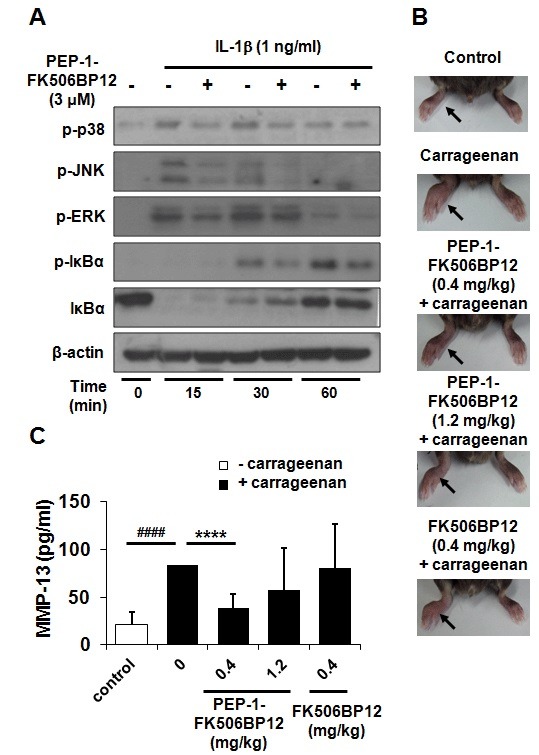Fig. 4. The effect of PEP-1-FK506BP12 on MAPK and NF-κB activation in primary chondrocytes and MMP-13 expression in a mouse carrageenan-induced paw arthritis model. (A) PEP-1-FK506BP12 inhibits IL-1β-induced MAPK and NF-κB activation. Chondrocytes were incubated with PEP-1-FK506BP12 (3 μM) for 2 h and then with IL-1β for 15, 30, and 60 min. The levels of phosphorylated p38, JNK, ERK1/2, and IκBα were measured by Western blotting. β-actin served as the loading control. The blot is representative of the results of three independent experiments using cartilage from three different donors. (B, C) The anti-inflammatory effect of PEP-1-FK506BP12 in a mouse carrageenan-induced paw edema model. PEP-1-FK506BP12 (0.4 and 1.2 mg/kg) and FK506BP12 (0.4 mg/kg) was injected into the mouse hidpaw (n=5 mice/group) 2 h prior to injecting 2.5% carrageenan. The mice were euthanized 4 days later. (B) PEP-1-FK506BP12 suppresses carrageenan-stimulated inflammation in the mouse hindpaw. Representative image of a hindpaw from each group. The arrows indicate the carrageenan injection sites. (C) Carrageen-induced MMP-13 expression is inhibited by PEP-1-FK506BP12. Tissue homogenates were prepared as described in Materials and Methods. Data are expressed as the means ± SDs of duplicate experiments performed using tissue homogenates from three different animals. ####P < 0.001 vs. untreated control mouse. ****P < 0.001 vs. results from a carrageenan-injected mouse. − carrageenan, carrageen-non-injected group; + carrageenan, carrageenan-injected group.

